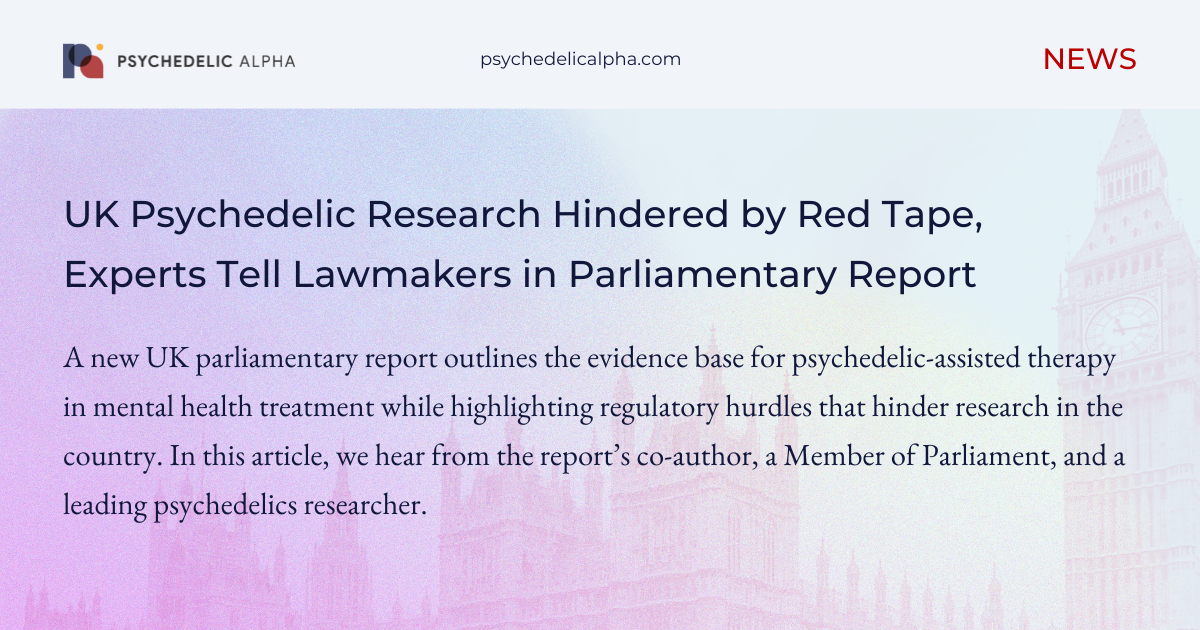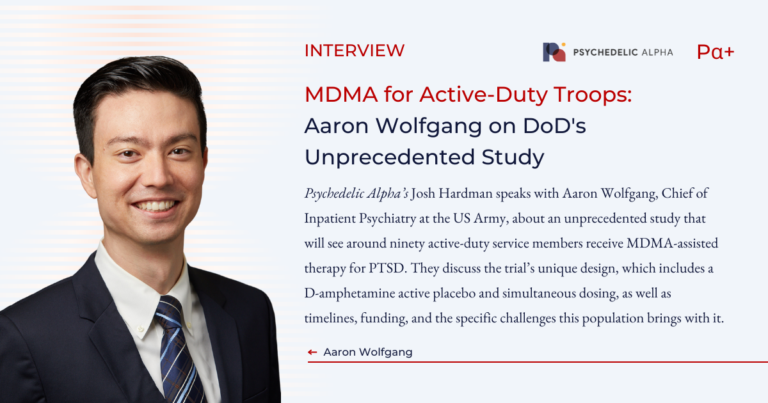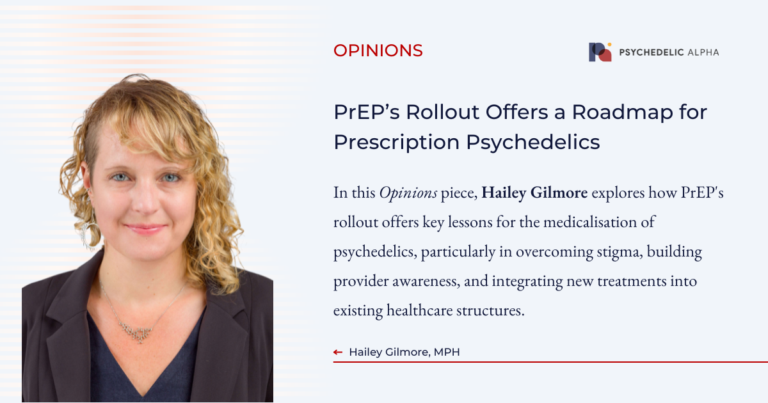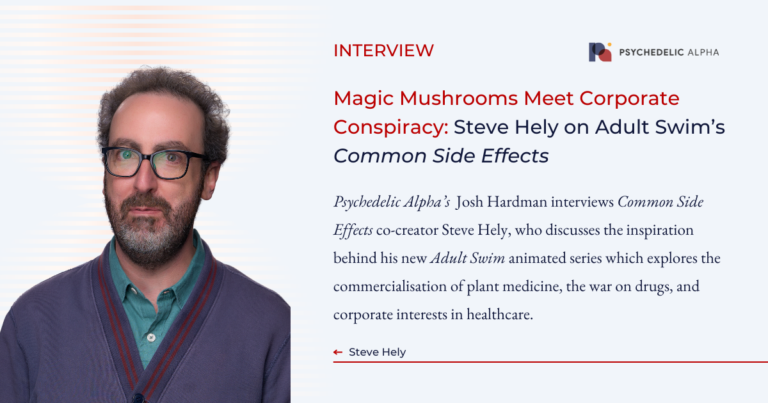A new briefing from the UK Parliamentary Office of Science and Technology (POST) provides politicians with up-to-date information on the benefits and risks of psychedelic-assisted therapy, which brings into focus the arguments in favour and against reassessing Schedule 1 drugs.
Written by Charles Bliss for Psychedelic Alpha.
An independent parliamentary report summarising the state of UK psychedelic research and policy was released last week.
Titled Psychedelic-assisted therapy for mental health: Policy considerations (POSTbrief 64), the document provides an overview of contemporary research, regulatory challenges and policy considerations surrounding psychedelic-assisted therapy (PAT) for mental health conditions. It aims to inform UK policymakers about psychedelic research and the challenges that must be addressed for its potential to be fully realised.
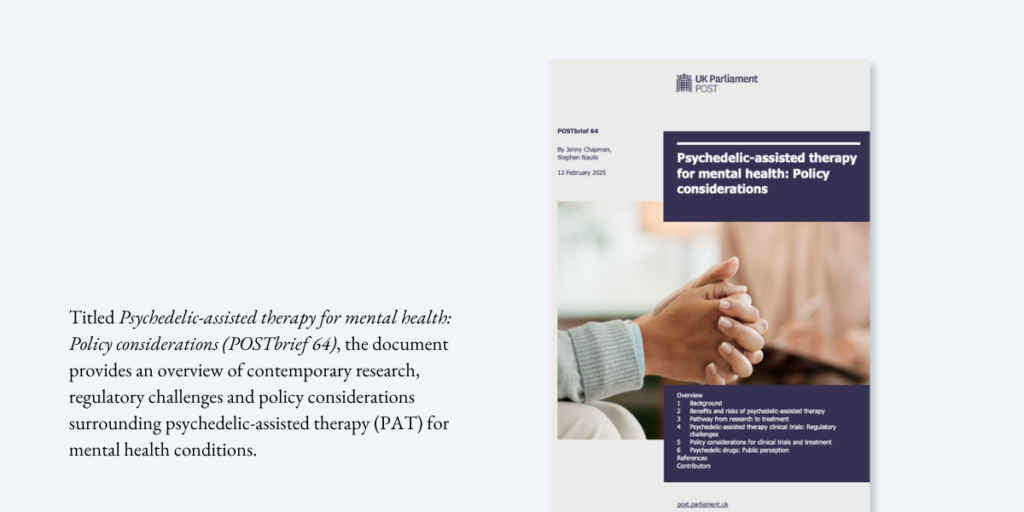
The briefing, written by Jenny Chapman and Dr Stephen Naulls, highlights the potential of PAT as a transformative treatment for mental health conditions—but emphasises the need for more research, regulatory reform and careful policy considerations to ensure safety, efficacy and equitable access.
A POSTbrief is a document published by the UK Parliamentary Office of Science and Technology (POST) that makes research evidence accessible to members of Parliament. POST was originally inspired by the now-defunct United States Office of Technology Assessment (OTA) after a group of parliamentarians visited in 1985. The OTA was established to offer congressional members and committees objective, authoritative analysis of complex scientific and technical issues. Conservative Party politician Sir Ian Lloyd suggested to Prime Minister Margaret Thatcher that the UK government should install a similar institution to serve Parliament in “exactly the same way as such an institution serves the Congress of the United States”. After Thatcher refused to commit financial support, Lloyd pursued private charitable donations and founded the office in 1989. By 2001, POST had secured permanent government funding.
POST supports knowledge exchange between scientists and politicians by identifying emerging areas of interest and publishing “impartial, balanced and peer-reviewed briefings” to parliamentarians, government officials and all-party parliamentary groups (APPGs). These briefings support MPs and select committees by summarising evidence on important public policy issues with a scientific or technological dimension. The reports are intended to help legislators understand the range of opinions on a subject and ensure that “the best available research evidence and information is brought to bear” on lawmaking and government scrutiny.
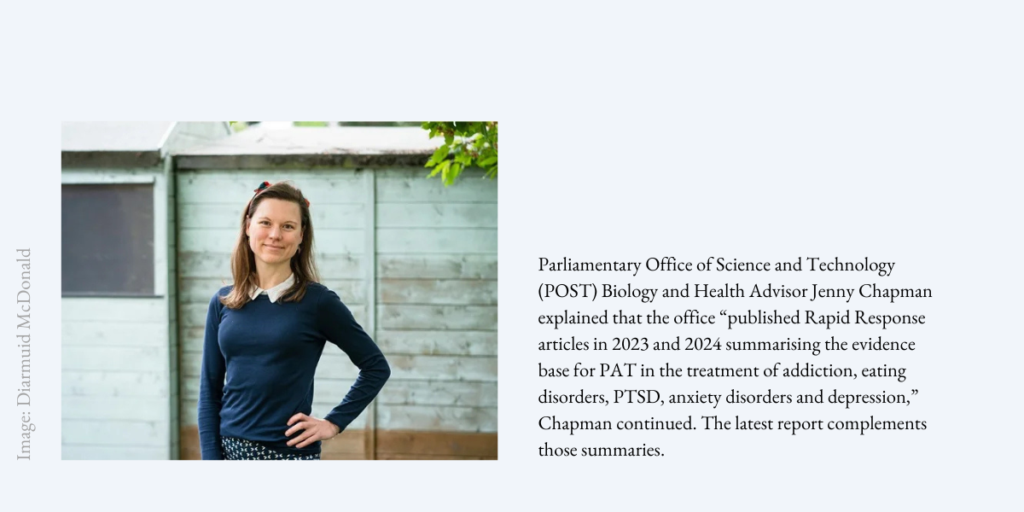
Co-author Jenny Chapman told Psychedelic Alpha: “POST consults a range of stakeholders—both inside and outside of Parliament—when deciding what to research, so we ensure our briefings are relevant and timely. For example, we conduct a thorough Horizon Scan, and we seek feedback from the POST board members.”
“POST published Rapid Response articles in 2023 and 2024 summarising the evidence base for PAT in the treatment of addiction, eating disorders, PTSD, anxiety disorders and depression,” Chapman continued. “The Psychedelic-assisted therapy for mental health: Policy considerations briefing was written to accompany these summaries.”
POSTbrief 64 was created in response to the resurgent interest in psychedelic research, as modern clinical trials evaluate the therapeutic potential of PAT. Scientific inquiry into these compounds was largely halted in the 1970s due to restrictive drug legislation, but in recent years a groundswell of scientific, academic and public interest in psychedelics has led to renewed demand to re-evaluate their legal status. Psilocybin, for example, had only been mentioned five times in the House of Commons and the House of Lords until 2020, according to Hansard data. But since then, the topic has been raised 54 times, including during a debate on access to psilocybin treatments in 2023.
With the exception of ketamine, all psychedelics are designated as Schedule 1 and Class A drugs in the UK, which means they are considered to have no recognised therapeutic or medical potential, are the most harmful when misused, and carry the greatest legal penalties for possession and supply. (Ketamine is currently classified as Class B, along with cannabis, amphetamines and barbiturates. But the government is considering placing ketamine into the most restrictive category, Class A, alongside substances such as cocaine, heroin, MDMA, LSD and psilocybin due to concerns over a significant rise in recreational ketamine use and associated health risks including kidney and bladder damage.) Universities and hospitals seeking to research drugs in Schedule 1 require a Home Office licence to conduct clinical trials. This status makes research into the compounds “time-consuming, expensive and logistically difficult”, according to the POSTbrief.
This is compounded by the public perception of drugs like LSD and psilocybin, which are often associated with recreational use and criminality. Stigma can hinder research funding and mainstream acceptance, the report suggested.
Rescheduling psychedelic drugs would help to remove impediments to research, which could generate evidence-based therapeutic interventions to address mental health conditions. One recent example of the restrictive effects of the current scheduling status on research involved Irish 5-MeO-DMT drug developer GH Research, which had planned to use UK trial sites for its Phase 2b study of GH001 in treatment-resistant depression. GH conducted the Phase 2b trial at sites across Ireland, Germany, Spain, Poland, Czechia and the Netherlands, but UK trials never got off the ground. “UK sites were activated but couldn’t enrol due to significant delays in control drug licences and bureaucracy,” CEO Velichka Valcheva told Psychedelic Alpha.
In 2022, a petition requesting the rescheduling of psilocybin collected 11,824 signatures. It called on politicians to reduce unnecessary obstacles to medical research on noncurable conditions, which “slow the development of new and vital treatments”. In response, the Conservative government stated that it “sympathises with patients suffering from distressing conditions and can understand the desire to seek the best possible treatment available” but that it had “no plans to reschedule psilocybin to Schedule 2”.
Activist groups such as Psilocybin Access Rights are calling on the UK government to “review the evidence, reschedule psilocybin and make it accessible for researchers and doctors to prescribe to patients who could benefit”. An open letter addressed to the Home Office and signed by Charlotte Nichols MP, Vikki Slade MP and Chris Coghlan MP demanded an urgent review of psilocybin with a view to rescheduling “without delay”.
In 2023, the Home Affairs Committee recommended that the UK government “urgently moves psychedelic drugs to Schedule 2 in order to facilitate research on the medical or therapeutic value of these drugs”. The sitting Minister of State for Crime, Policing and Fire at the time, Chris Philp MP, commissioned the Advisory Council on the Misuse of Drugs (ACMD) to instruct on how to reduce “barriers to research” for all Schedule 1 controlled drugs. The ACMD suggested that universities and hospitals conducting research with compounds like LSD and psilocybin be exempt from the need to apply for a Home Office domestic licence. But more than one year later, the government has still not responded to the ACMD report.
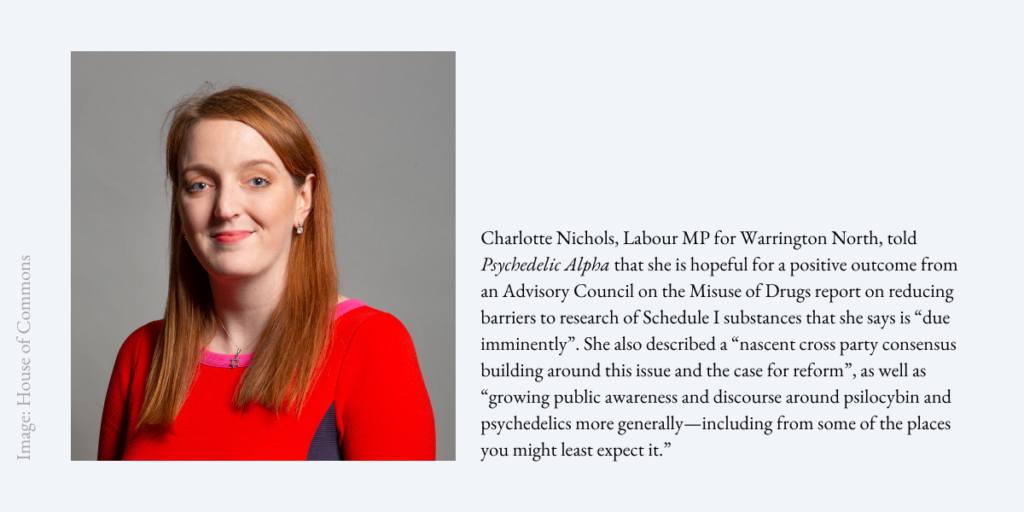
Charlotte Nichols MP told Psychedelic Alpha that, based on her recent conversations with the current Home Office Minister with responsibility for drugs policy, Dame Diana Johnson DBE MP, she understands that the government’s response to the ACMD report is “due imminently”.
“I am hopeful—given Dame Diana’s deep understanding of the issues around this as the former Chair of the Home Affairs Select Committee at the time of their excellent inquiry report into drugs policy in 2023—that it will be positive,” Nichols said.
“I interpret the POST briefing as seeking to enable an evidence-based discussion to take place by Parliamentarians in the coming months,” Nichols added. “There is a nascent cross party consensus building around this issue and the case for reform, particularly in the context of a mental health crisis in our communities and growing public awareness and discourse around psilocybin and psychedelics more generally—including from some of the places you might least expect it.”
POSTbrief 64 states that the available evidence to support the efficacy of PAT is “complicated”. This is due to the relatively small number of trial participants and the paucity of long-term data on the psychological and physiological effects of the drug therapy. However, in comparison with conventional antidepressant treatment, psychedelics “can be more effective than commonly prescribed medications” such as selective serotonin reuptake inhibitors (SSRIs), according to the report.
The briefing provides a synopsis of the potential benefits and risks of therapeutic intervention with classic psychedelics like LSD, psilocybin and DMT, as well as psychedelic-adjacent drugs like MDMA and ketamine. It highlights short-term side effects like anxiety, nausea and increased heart rate, but stresses that long-term effects are less understood. Despite this, the report cited evidence that suggests low toxicity and low potential for addiction with respect to psilocybin and LSD.
If PAT were to be approved in the future, it is critical that safeguards are implemented which ensure patient safety, prevent drug diversion and address ethical concerns. Furthermore, policymakers must consider how to make PAT accessible, affordable and scalable if it becomes an approved treatment, the authors wrote.
There is also confusion among the public between rescheduling the drugs for research purposes and decriminalisation or legalisation of psychedelics, the report said.
In the US, the schedule system combines law enforcement and medical regulation, which means a drug’s legal penalties and medical use are determined together. But the UK uses a dual system of drug classes and drug schedules to regulate controlled substances.
Under the Misuse of Drugs Act 1971, UK drug classes—Class A, Class B and Class C—rank the perceived harmfulness and potential for abuse of certain substances. Classes were created for criminal justice and law enforcement purposes. The classification determines the severity of legal penalties for possession, supply and production. Class A, the most restrictive, has a maximum penalty for supply and production of life in prison, an unlimited fine, or both, while possession carries up to seven years in prison. Meanwhile, under the Misuse of Drugs Regulations 2001, UK drug schedules dictate the medical availability, prescription rules and handling requirements of controlled drugs, which affect how accessible the substances are for researchers looking to conduct clinical trials.
Stakeholders interviewed for the POST report, including Psychedelic Alpha Editor Josh Hardman, said they were “concerned” that calls to reschedule psychedelics to facilitate further PAT research were often conflated and confused with campaigns to decriminalise or legalise them, due to public misunderstanding surrounding the classification and scheduling policies combined with the stigma associated with illegal drugs.
Other hindrances involve prohibitively high costs associated with PAT clinical trials. Researchers must pay licence application fees of between £3,000 and £4,000, as well as annual renewal fees, inspection fees, Disclosure and Barring Service (DBS) fees for staff handling the drugs, and export and import licence fees.
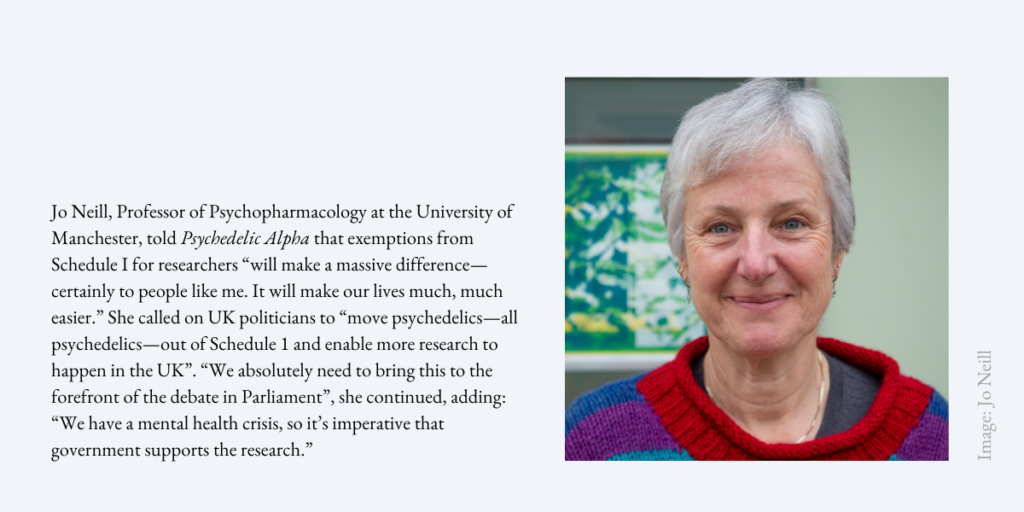
Jo Neill, Professor of Psychopharmacology at the University of Manchester, was one of the scientists consulted for POSTbrief 64. She told Psychedelic Alpha: “Many people will not do this research because they cannot afford it. If they’re in a small institution, they haven’t got much grant money.”
Neill said that the process for obtaining Home Office licences to work with Schedule 1 drugs “absolutely hinders collaboration and scientific research”. “When you write a project licence, you have to be very specific about what you will do and the way in which you will do it,” she said. “As a scientist, you have ideas all the time about how you would change your experiment to do something different, and then you have to apply to the Home Office—and that’s another six months of a lot of bureaucracy.
“Research exemptions will make a massive difference—certainly to people like me. It will make our lives much, much easier.”
We asked Neill what message she had for UK politicians in light of the POSTbrief. “Please move psychedelics—all psychedelics—out of Schedule 1 and enable more research to happen in the UK,” she said. “We absolutely need to bring this to the forefront of the debate in Parliament. We have a mental health crisis, so it’s imperative that government supports the research.”
The POSTbrief found that, in order to better understand the safety and efficacy of psychedelic medicines, more comprehensive clinical trials with larger and more diverse patient populations over a greater time period must be conducted. But barriers to research—such as incompatible drug licence and funding timescales—limit the scale and diversity of clinical trials, while also deterring scientists from entering the psychedelic field and inhibiting academic collaboration. Further research which might produce the evidence necessary to justify the rescheduling of psychedelics is therefore hampered by the current scheduling status—a circular argument which so far has yet to be resolved.
During a parliamentary debate on proscribed psychedelic drugs, Chris Philp MP said: “I accept that there is an element of chicken and egg or Catch-22 about the situation, because we need to do the research before there is an evidence base to justify the rescheduling that might be merited.”
It remains to be seen how UK politicians might use the evidence contained in POSTbrief 64 to escape this paradox.
You might also like…

